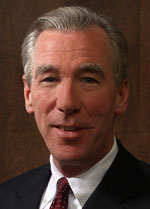Hablas espanol?
What do you call someone who speaks two languages? Bilingual. And three languages? Trilingual. And someone who speaks just one language? An American, of course.
It’s an old joke that speaks for itself, but behind it there’s a long back story. We Americans are victims of our own success — with a bit of the credit going to our British forebears.
By the 19th century the sun never set on the English language. And its world dominance came with the rise of America’s military and then economic power in the mid-20th century. It has turned us all into linguistic imperialists.
English is the mutt of European languages, having borrowed heavily from nearly every linguistic family on the continent. Its diversity of background has made it one of the most subtle, nuanced and difficult languages in the entire world. English orthography, which has been settled for only a couple of centuries, nonetheless contains nearly as many exceptions as rules.
It is also perhaps the most entrepreneurial language. Unlike others — French, for example, whose purity is strictly guarded by an established authority — English vocabulary remains a virtual free-for-all, with thousands of new words simply invented and widely accepted every year. The same is true of English usage and even English grammar, whose evolution over short periods is shockingly fast.
Nearly every European learns English in school; so do many Asians, Africans and Latin Americans. It has become the language of commerce and world culture, much like Latin in medieval times and common Greek in the ancient world. It is the only approved language for pilots and air-traffic controllers to use when airlines take off and land in 157 countries around the world.
This has struck me during my visits to universities in Italy, Spain, Argentina and Chile and in receiving visitors from Taiwan, China, Ukraine and Poland. We almost always speak English to one another. Oddly, that’s why I come away from these visits feeling inadequate. How is it that the rest of the world speaks several languages, and we Americans know only our own? Our success as linguistic imperialists has moved other people to learn our language, but Americans feel almost no need to learn theirs.
The demand for foreign languages among our young people varies with the prominence of the countries where they are spoken. When I was young and the Cold War was hot, everyone wanted to learn Russian. Today it’s Chinese and Spanish, the two most widely spoken native tongues in the world.
There is growing demand for Chinese and Arabic in our Department of Modern Languages and Literatures at Catholic University, but the most popular is Spanish, the second most commonly used language in the United States and the most widely used in the Catholic Church. Almost 40 percent of the world’s Catholics live in Latin America, and 40 percent of Catholics in the United States are Hispanic.
It’s my job to think about how to educate our children, and this prompts me to think about two things. One is what a great gift it is for children to grow up in a home where people speak a language other than English — it is the easiest way to pick up a second language. It comes naturally, without tests or homework, and it gives one a flawless accent.
The other thing is that every college student should study a foreign language. Even better, everyone should spend a year of his or her academic career in a non-English-speaking country. There exists in the academic world a tension between the two goals of broadening students’ cultural horizons and preparing them for future careers. I cannot think of anything else that advances both goals so well as time spent outside our linguistic empire.
***
Garvey is president of The Catholic University of America in Washington, D.C.
PREVIOUS: America shrugged: What we lose without a sense of awe
NEXT: Caring for the frail and sick also is part of being pro-life




Share this story